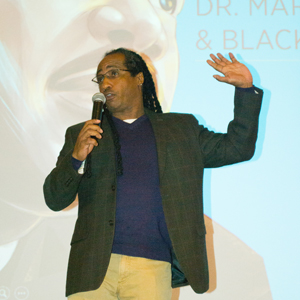UMB Celebrates Black History Month
This year’s Dr. Martin Luther King Jr./Black History Month commemoration at the University of Maryland, Baltimore (UMB) featured the film MLK Boulevard: The Concrete Dream, in which director Marco Williams visits some of the hundreds of roads in the U.S. named after the slain civil rights leader and asks whether the streets, sometimes in poor African-American neighborhoods, honor King’s legacy or serve as reminders of a dream unfulfilled.
The film also documents battles — often heated and racially charged — over changing road names to recognize King. “It’s as much about the conversation as it is the end result,” said Williams, who spoke at the Feb. 4 event and answered questions.

Marco Williams
“Your film is especially relevant here at UMB,” University President Jay A. Perman, MD, told Williams, “given that Baltimore’s own MLK Boulevard sits just a short distance west of where we gather right now, and given that many in the city still justifiably see this street as a dividing line between wealth and want, between opportunity and isolation.”
Perman said older UMB buildings along Martin Luther King Jr. Boulevard were constructed with brick facades that seem to say to neighborhoods on the other side, “Don’t look at us, and we won’t look at you.” But recent developments such as the 2010 opening of the Pharmacy Hall Addition, which features glass walls facing West Baltimore, and expansion of the University of Maryland BioPark on the west side of the boulevard, have helped make the roadway “less of a barrier” and “more of the central road in our joint community,” Perman said.
“We in this University have embraced our responsibility to cross that boulevard properly through an abiding commitment to community,” Perman said.
About 325 people from throughout the campus attended the annual MLK/Black History Month event, held in the auditorium of the Medical School Teaching Facility.
“We need to understand that this day is an affirmation,” Perman said, an affirmation “that diversity is our strength, equality is our aim, and service is our obligation.”
The event included presentation of the University’s annual MLK Diversity Recognition Awards. This year’s winners are Charmaine Rochester-Eyeguokan, PharmD, CDE, BCPS, BCACP, associate professor at the School of Pharmacy (Outstanding UMB Faculty Award); Wendy Shaia, EdD, MSW ’01, executive director of the Social Work Community Outreach Service (SWCOS) at the School of Social Work (Outstanding UMB Staff Award); and the Latina/o Law Students Association and the Immigration Law and Policy Association, each at the Francis King Carey School of Law (Outstanding UMB Student Award).
Rochester-Eyeguokan was honored for her work with two national organizations — the Women’s Missionary Union and the Samaritan Women — to help female victims of human trafficking. Shaia, as the head of SWCOS, oversees the group’s implementation of the Community Schools Initiative, an outreach effort that has elevated academic success at Baltimore schools through improved student attendance and greater parental involvement. And the efforts of the Maryland Carey Law student groups, which provided assistance last fall to children appearing before the Baltimore Immigration Court, promoted awareness of the problems faced by unaccompanied foreign-born minors during the immigration process.
Williams, a Peabody Award-winning filmmaker whose acclaimed work focuses on race and immigration issues, said he became emotional after hearing the achievements of the MLK Diversity Recognition Award winners.
“I feel dwarfed in comparison to the work of all of you who have been honored here today,” he said.
Perman thanked the University’s Diversity Advisory Council “for forwarding such worthy nominations” for his consideration, and he expressed appreciation to the award winners and others at UMB who serve people facing oppression, deprivation, exploitation, and injustice.
“By your work, you honor the memory of Dr. King and the very humane principles to which he dedicated his life,” Perman said.



